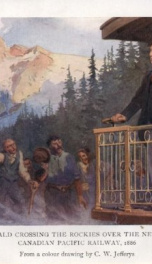The Day of Sir John Macdonald

CHAPTER I YOUTH John Alexander Macdonald, second son of Hugh Macdonald and Helen Shaw, was born in Glasgow on January 11, 1815. His father, originally from Sutherlandshire, removed in early life to Glasgow, where he formed a partnership with one M'Phail, and embarked in business as a cotton manufacturer. Subsequently he engaged in the manufacture of bandanas, and the style of the firm became 'H. Macdonald and Co.' The venture did not prove successful, and Macdonald resolved to try his fortunes in the New World. Accordingly, in the year 1820, he embarked for Canada in the good ship Earl of Buckinghamshire, and after a voyage long and irksome even for those days, landed at Quebec and journeyed overland to Kingston, then and for some years after the most considerable town in Upper Canada, boasting a population (exclusive of the military) of about 2500 souls. At that time the whole population of what is now the province of Ontario did not exceed 120,000, clustered, for the most part, in settlements along the Bay of Quint?, Lake Ontario proper, and the vicinity of the Niagara and Detroit rivers. The interior of the province was covered with the primeval forest, which disappeared slowly, and only by dint of painful and unceasing toil. The early accounts of Kingston bear eloquent testimony to its primitive character. In 1815, according to a correspondent of the Kingston Gazette, the town possessed no footways worthy of the name, in consequence of which lack it was, during rainy weather, 'scarcely possible to move about without being in mud to the ankles.' No provision existed for lighting the streets 'in the dark of the moon'; a fire-engine was badly needed, and also the enforcement of a regulation prohibiting the piling of wood in public thoroughfares. Communication with the outside world, in those early days, was slow, toilsome, and sometimes dangerous. The roads were, for the most part, Indian paths, somewhat improved in places, but utterly unsuited, particularly in spring and autumn, for the passage of heavily laden vehicles. In 1817 a weekly stage began running from Kingston to York (Toronto), with a fare of eighteen dollars. The opening of an overland highway between Kingston and Montreal, which could be travelled on by horses, was hailed as a great boon. Prior to this the journey to Montreal had been generally made by water, in an enlarged and improved type of bateau known as a Durham boat, which had a speed of two to three miles an hour. The cost to the passenger was one cent and a half a mile, including board. In the early twenties of the nineteenth century the infant province of Upper Canada found itself slowly recovering from the effects of the War of 1812-14. Major-General Sir Peregrine Maitland, the lieutenant-governor, together with the Executive and Legislative Councils, was largely under the influence of the 'Family Compact' of those days. The oligarchical and selfish rule of this coterie gave rise to much dissatisfaction among the people, whose discontent, assiduously fanned by agitators like Robert Gourlay, culminated in open rebellion in the succeeding decade. Such was the condition of things prevailing at the time when the future prime minister arrived in the town with which he was destined to be in close association for nearly three-quarters of a century.
Info about the book
Author:
Series:
Unknown
ASIN:
B004Q3RE6U
Rating:
5/5 (3)Your rating:
0/5
Languge:
English
Users who have this book
Users who want this book
What readers are saying
What do you think? Write your own comment on this book!
write a commentif you like The Day of Sir John Macdonald try:
Other books by this author
Do you want to exchange books? It’s EASY!
Get registered and find other users who want to give their favourite books to good hands!


